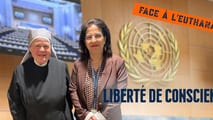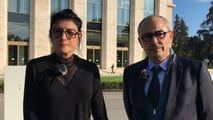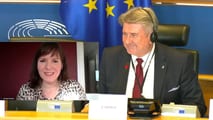
The ECHR, although "angry" (according to Le Monde), decided not to respond publicly, unlike many politicians and several ministers - notably Bulgarian and Russian - who publicly expressed concern about the situation. Even the Committee of Ministers, the Council of Europe's supreme body of 47 ambassadors, of which the European Court depends, was forced to admit publicly that the report was true, indicating that it would reassess "by the end of 2024, in light of further experience, the effectiveness of the current system for the selection and election of the Court’s judges." (8 April 2021). Shortly afterwards, on 20 April 2021, the Open Society failed for the first time to get one of its employees elected as a judge in Strasbourg. The barrage, caused by the ECLJ report, was too strong.
On 26 July, the Committee of Ministers once again publicly responded to two parliamentary questions pointing out the dysfunctional nature of the procedure for recusal and the impossibility of requesting a review of the Court's decisions. This reply, like the previous one, showed the full attention of the ambassadors to these issues, while making it clear that it is only up to the Court to solve these problems. Here again, the Committee of Ministers provided a way out by revealing that the Court had undertaken to review its Rules "including Article 28" which deals precisely with the issue of conflicts of interest. Finally!
The inadequacy of Article 28 of the Rules of Court was precisely denounced in the ECLJ report because it did not require judges to declare their conflict of interest situations and did not provide for a formal procedure for recusal. Its revision is necessary, and we can rejoice that it be on its way, even if it is in a confidential manner and will not, it seems, be completed for several months.
Last but not least, the ECHR published on 2 September a new version of its "Resolution on Judicial Ethics" adopted on 21 June 2021. This is an internal text which specifies the Rules of Court and the ethical obligations of judges. The previous text dated from 2008; comparing it with the new text, it appears that the revision is profound and partially responds to the ECLJ report.
The new text "turns the screw:" it reinforces the obligations of integrity, independence and impartiality of judges. Echoing the ECLJ report, the resolution now obliges judges to be independent from any institution, including any "body" and "any private entity," referring to NGOs and other foundations such as the Open Society. The text adds that "They shall keep themselves free from undue influence of any kind, whether external or internal, direct or indirect. They shall refrain from any activity, expression and association, refuse to follow any instruction, and avoid any situation that may be considered to interfere with their judicial function and to affect adversely public confidence in their independence." The previous text was much more succinct.
On impartiality, the new text adds the explicit prohibition that judges "shall not be involved in dealing with a case in which they have a personal interest," thus strengthening the prevention of conflicts of interest. Judges must also refrain from "any activity, expression and association that may be considered to affect adversely public confidence in their impartiality."
The Court's new Judicial Ethics Resolution also places a new obligation on judges to be diligent in their judicial duties, to limit their outside activities, and most significantly, to curb their language, by refraining "from expressing themselves, in whatever form and medium, in a manner which may undermine the authority and reputation of the Court or give rise to reasonable doubt as to their independence or impartiality." The aim for the Court is to limit its criticism by the judges themselves; this new ban follows the book in which former Slovenian judge Boštjan Zupančič reveals the inner workings of the ECHR, after having sat there for 18 years (On the European Court of Human Rights: An Insider’s Retrospective (1998–2016), Eleven International Publishing, 2019).
Another new prohibition concerns the acceptance of "any decorations or honours during their mandate as a Judge of the Court". This measure follows the scandal caused by the way the current President of the ECHR was "had" during an official trip to Turkey in September 2020, accepting an honorary doctorate from the public university, while failing to meet with opponents and victims of the regime.
Thus, overall, it appears that the scandal of the 'Soros-Judges' report – as the media called it - is bearing fruit, because it was justified. It was useful to shake up the Court, and even to take blows in return, to achieve an improvement in its internal procedures. The scandal was necessary.
However, much remains to be done, as the European Court still does not enforce all the rules it itself prescribes to national courts on transparency and fair trial rights. Several specific recommendations made by the ECLJ and supported by eminent lawyers are still awaiting a response. We will ensure that these are on the agenda. As the ECHR recognized it : one "should be able to draw the public’s attention to potential shortcomings in the justice system; the judiciary may benefit from constructive criticism." (Morice v. France)
Finally, beyond procedural issues, I hope that this report - and the more recent one on The Financing of Experts of the Human Rights Council - will contribute to raising awareness of the growing phenomenon of the stranglehold of a few private foundations and NGOs on the international bodies that set the world policy on human rights and democracy.













